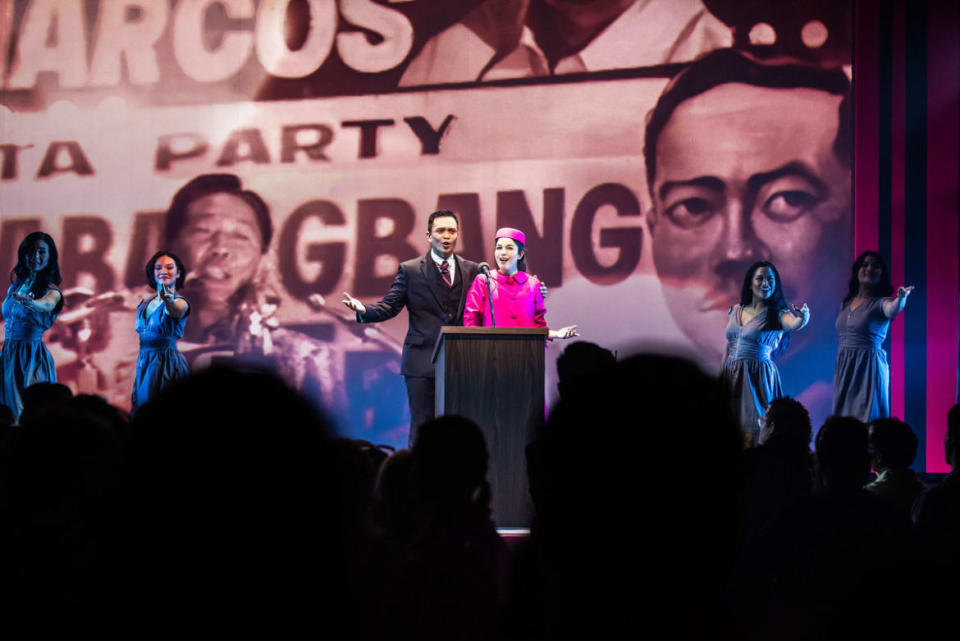Review: David Byrne’s ‘Here Lies Love’ Is a Weird Dictatorship Song and Dance

- Oops!Something went wrong.Please try again later.
- Oops!Something went wrong.Please try again later.
- Oops!Something went wrong.Please try again later.
- Oops!Something went wrong.Please try again later.
- Oops!Something went wrong.Please try again later.
Immersive theater should feel participatory and intriguing, but right from the beginning Here Lies Love (Broadway Theatre, booking to Sept 3) feels hectoring—before ultimately becoming a big, baffling Broadway mess.
If you buy tickets to stand amid the action on the ground floor, you are told to be aware of the revolving stage, and to follow the instruction of stagehands who hold colored batons. If you are seated upstairs, you are told when to get up and dance, and what to say.
Imelda Marcos Is Here to Teach Us How Wannabe Autocrats Like Trump Really Think
It is important to note that David Korins’ refitted Broadway Theatre looks stunning; it has been transformed into a discotheque with DJ (Moses Villarama)—and a theater valiantly kind of hanging on in there—with stunning lighting design by Justin Townsend and projections running down its flanks by Peter Nigrini.
But it’s what all the music (by David Byrne and Fatboy Slim), and the get-up-and-dance instruction is in service of that is the offensively under-realized puzzle of Here Lies Love. (And what does the title mean by invoking the words of what Imelda hopes is written on her tombstone? The musical does not make a persuasive, or even clear, case for it.)
The 90-minute musical is about the rise and implosion of the Marcos regime in the Philippines, and given the scale and brutality of their crimes against an entire country, the musical sings and dances up a storm, while not making much of a case there is anything to sing and dance about. There is a lot of concept and dazzle in Here Lies Love, but not much consideration given to what it’s all for.
It is not that the performers don’t give it their energetic best. Arielle Jacobs is a fierce and fearsome Imelda, transformed from country girl in a whirl (in bravura opening numbers like “Here Lies Love” and “The Rose of Tacloban”) to iron-bouffanted default-dictator. In comparison, Jose Llana as Ferdinand Marcos recedes a little, while Conrad Ricamora has the most demanding job on stage—to endow with the material with the seriousness it merits. As opposition leader Ninoy Aquino he urgently relates the destruction, persecution and cruelty of the Marcos regime. But, given the sweep of the musical, these feel more killjoyish than vital words. The energy of the music, the energy of the show, follows the dash and glamor of the Marcoses as they rise to power.

Jose Llana, left, and Arielle Jacobs in ‘Here Lies Love.’
The choreography (Annie B-Parson) and direction (Alex Timbers) is in a constant, theater-filling flux. The show is absolutely the spectacle it intends to be, a visual cornucopia. But what on earth is it making a spectacle out of? There is nothing feelgood about the motivations and rule of the Marcoses. You can’t reduce them, as one song does, to a groovy seventies cultural product, like Studio 54, namechecking celebrities of the time as if this were just another exercise in tamely nostalgic excavation.
And, OK, if you want to suck all that we know out of our heads and go full camp—and ignore all their despicable actions—what is Imelda Marcos most known for? Her shoe collection. What is missing from Here Lies Love? Any sign of shoes, and any song about them!
Amid all the blazing sounds and visual fury, there is precious little character development. We don’t really get a sense of Imelda’s character transformations from innocent to cruel leader. We don’t see anything of the Marcos marriage. We don’t see their evolution into power-hungry, abusive monsters. Projections showing news headlines sketch the dark history of the Philippines, while the audience is left with song and dance and lights and froth, and occasional instructions and dance and wave our hands in the air.

Conrad Ricamora as Ninoy Aquino in ‘Here Lies Love.’
Sometimes the songs are beyond ridiculous. A number like “Gate 37,” in which Ricamora as Aquino anticipates—sadly correctly—being assassinated as soon as returns to the Philippines from temporary exile in America, should be searing, but it’s laughably twee and ridiculous, underscoring that the marriage of musical and politics can sometimes feel a forced and absurd one. Lea Salonga as Aurora Aquino, Ninoy’s mother, sings one song at the end, “Just Ask the Flowers”—a beautiful ballad and lament for sure, but not as show-stopping as it needs to be. And who was Aurora Aquino as a person? The musical doesn’t say. She appears, then she disappears.
After the audience has witnessed Imelda’s terrible transformation, she and the remaining characters are bellow-singing “Why don’t you love me?” all around the theater. Again, the sentiment, the demand, seems as mad as it is unearned. Love seems to be the last thing Imelda is lacking; she insists on devotion and loyalty from all she encounters.
The problem that Here Lies Love cannot solve is that this is not a period of history to easily craft a pulsating dance musical around—and, if you are determined to do so, then it needs greater attention to characterization and story than what is left to the projections here to handle as kind of dutiful sidebars to the gleeful circus galloping around them. A final song underscores the gravity of history, but it is stark contrast to the revels that have preceded it—far too little, far too late.
Here Lies Love doesn’t just trivialize dictatorship and real-life horror—especially egregious given the political period we are living in—it is also yawns arrogantly and lazily at history. Yes, the show looks and sounds distinctive. Yes, it’s admirable to try something new in a Broadway theatre to engage a wide audience, but not at the expense at minimizing gravely consequential politics. There is really nothing to disco-dance about here. Here Lies Love ends up feeling almost magnificently grotesque.
Flex
If you want to know how invested the audience gets in Candrice Jones’ Flex (Lincoln Center Theater, to August 20), wait to the end—and the climactic championship the Lady Train high school basketball team take part in, whose squabbles, wit, backchat, and tangled relationships we have been following for the last two-plus hours. The woman adjacent to this critic was furiously crossing and uncrossing her legs as the final match took place. Would they win?
Matt Saunders’ wonderful set of a scrappy basketball court has a final surprise that got a round of applause all its own. Indeed, the whooping, sighing, applause and interactions of other audience members make clear how sharply the play—about a group of young Black women in smalltown Arkansas in 1998, directed with a vivid energy by Lileana Blain-Cruz—was hitting home. (It reminded this critic that Sarah DeLappes’ The Wolves, about a young female football team, also very literally played in the same semi-circular space.)

Erica Matthews and Tamera Tomakili in ‘Flex.’
And—wow—these actors can really play ball, particularly Erica Matthews as Starra, whose baskets throughout the show were all immaculately executed. She is the show’s antagonist, determined to succeed, and furious at the charmed life her great rival Sidney (Tamera Tomakili) seems to enjoy, with scouts from all the best teams beating at her door. Cherise (Ciara Monique) and Donna (Renita Lewis) are conducting a secret relationship, while Cherise ponders her faith and Donna leaving town.
The pregnancy of teammate April (Brittany Bellizeare) brings all the young women together—they do not want their coach (Christiana Clark) to eject her from the team. But it is Starra’s actions towards Sydney, and one particularly key act she does against her, that forms the real narrative engine of the play. That vindictive act comes to feel repetitive and overwritten—terrible as it is. What is wonderful to watch is the amazing basketball on stage, and the sharply written and supremely well-acted interactions of the women (especially after their car meets a soon-to-be-dead bird), and the no-shit wisdom of their coach.
Flex is a meditation on ambition, growing up and making opportunities happen. It is also about the meaning and practice of strength. Starra is infuriating in what she says and does, but through Matthews’ fierce poise we absolutely understand her unyielding nature. What makes a winner? Flex has many, very convincing, and also tough answers.
Get the Daily Beast's biggest scoops and scandals delivered right to your inbox. Sign up now.
Stay informed and gain unlimited access to the Daily Beast's unmatched reporting. Subscribe now.

